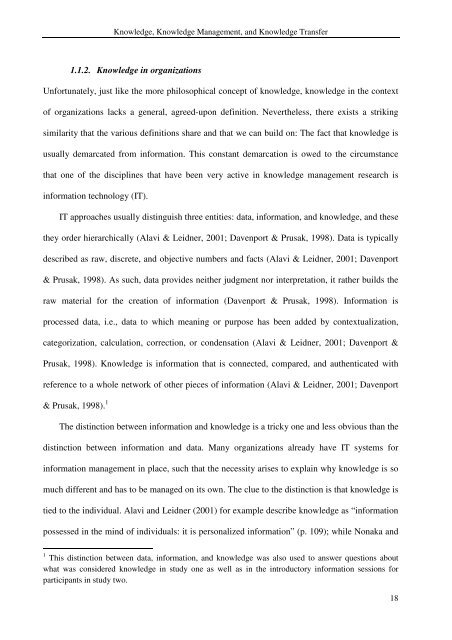thesis_Daniela Noethen_print final - Jacobs University
thesis_Daniela Noethen_print final - Jacobs University
thesis_Daniela Noethen_print final - Jacobs University
You also want an ePaper? Increase the reach of your titles
YUMPU automatically turns print PDFs into web optimized ePapers that Google loves.
Knowledge, Knowledge Management, and Knowledge Transfer<br />
1.1.2. Knowledge in organizations<br />
Unfortunately, just like the more philosophical concept of knowledge, knowledge in the context<br />
of organizations lacks a general, agreed-upon definition. Nevertheless, there exists a striking<br />
similarity that the various definitions share and that we can build on: The fact that knowledge is<br />
usually demarcated from information. This constant demarcation is owed to the circumstance<br />
that one of the disciplines that have been very active in knowledge management research is<br />
information technology (IT).<br />
IT approaches usually distinguish three entities: data, information, and knowledge, and these<br />
they order hierarchically (Alavi & Leidner, 2001; Davenport & Prusak, 1998). Data is typically<br />
described as raw, discrete, and objective numbers and facts (Alavi & Leidner, 2001; Davenport<br />
& Prusak, 1998). As such, data provides neither judgment nor interpretation, it rather builds the<br />
raw material for the creation of information (Davenport & Prusak, 1998). Information is<br />
processed data, i.e., data to which meaning or purpose has been added by contextualization,<br />
categorization, calculation, correction, or condensation (Alavi & Leidner, 2001; Davenport &<br />
Prusak, 1998). Knowledge is information that is connected, compared, and authenticated with<br />
reference to a whole network of other pieces of information (Alavi & Leidner, 2001; Davenport<br />
& Prusak, 1998). 1<br />
The distinction between information and knowledge is a tricky one and less obvious than the<br />
distinction between information and data. Many organizations already have IT systems for<br />
information management in place, such that the necessity arises to explain why knowledge is so<br />
much different and has to be managed on its own. The clue to the distinction is that knowledge is<br />
tied to the individual. Alavi and Leidner (2001) for example describe knowledge as “information<br />
possessed in the mind of individuals: it is personalized information” (p. 109); while Nonaka and<br />
1 This distinction between data, information, and knowledge was also used to answer questions about<br />
what was considered knowledge in study one as well as in the introductory information sessions for<br />
participants in study two.<br />
18

















